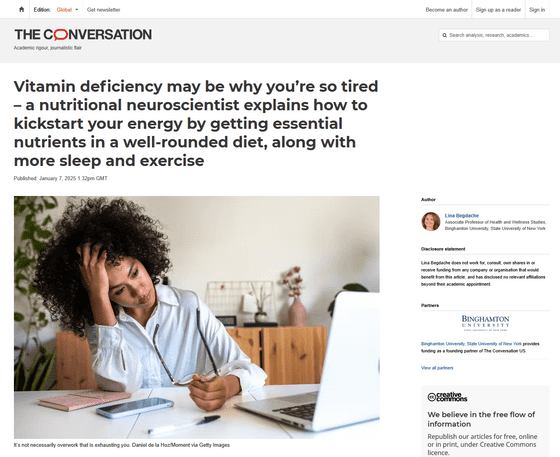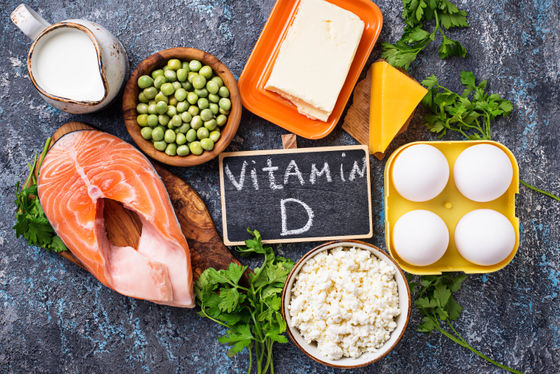A nutritional scientist explains the three nutrients that are lacking in people who are always tired

There are probably many people who feel tired every morning, or who realize that they still feel tired on Monday even though they had a good rest on the weekend. Lina Begdace, a certified dietitian and nutritional neuroscientist at Binghamton University, State University of New York, explains how 'nutrition' and 'lifestyle habits' have been found to be closely related to fatigue through various studies.
Vitamin deficiency may be why you're so tired – a nutritional neuroscientist explains how to kickstart your energy by getting essential nutrients in a well-rounded diet, along with more sleep and exercise

Vitamin D
According to Begdace, vitamin D is one of three essential nutrients whose deficiency is known to cause fatigue, and a deficiency can lead not only to fatigue but also muscle weakness, bone pain, mood disorders and impaired cognitive function.
Foods rich in vitamin D include oily fish such as salmon, sardines and rainbow trout, fortified milk, egg yolks, and vegetarian and vegan options include fortified plant-based milks and cereals, and mushrooms such as maitake and kikurage.

The US government's recommended daily intake of vitamin D is 400 IU (10 µg) for infants up to 12 months old, 600 IU (15 µg) for people aged 1 to 70 years, and 800 IU (20 µg) for people aged 70 years or older. You can get 800 IU by eating 150 g of salmon fillet. In addition, when treating vitamin D deficiency, it is said that a temporary dose of vitamin D above the recommended amount may be prescribed to return vitamin D levels to normal.
In addition, the Ministry of Health, Labour and Welfare has set the following recommended amounts for dietary intake of vitamin D in
| age | Recommended daily amount (μg) |
|---|---|
| 0-11 months | 5.0 |
| 1 to 2 years | 3.5 |
| 3 to 5 years | 4.5 |
| 6-7 years | 5.5 |
| Ages 8-9 | 6.5 |
| 10-11 years old | 8.0 |
| Age 12 and up | 9.0 |
Vitamin B12
Another important nutrient for fatigue recovery is vitamin B12, whose deficiency can impair energy production and cause anemia. Elderly people, pregnant and breastfeeding women, people with gastrointestinal disorders such as inflammatory bowel disease, people taking certain medicines such as proton pump inhibitors that suppress stomach acid secretion, and people with alcohol use disorder are particularly prone to vitamin B12 deficiency.
Vitamin B12 is found mainly in meat, fish, dairy products, and eggs, so vegetarians and vegans are encouraged to consider taking supplements. The recommended daily intake of vitamin B12 for people aged 4 and over is 2.4μg, which is roughly the same as the amount found in 85g of tuna or Atlantic salmon. Pregnant and breastfeeding women should consume a little more.
The dietary intake guidelines for vitamin B12 in the 'Report of the Committee to Draft the Dietary Reference Intakes for Japanese (2025 Edition)' are as follows:
| age | Recommended daily amount (μg) |
|---|---|
| 0-5 months | 0.4 |
| 6–11 months | 0.9 |
| 1 to 5 years | 1.5 |
| 6-7 years | 2.0 |
| Ages 8-9 | 2.5 |
| 10-11 years old | 3.0 |
| Age 12 and up | 4.0 |
Supplements are a good option when you can't get enough of the nutrient through your diet, and Begdace said, 'Taking vitamin B12 supplements can be just as effective as getting the vitamin through food, and taking supplements with food may enhance absorption.'
However, supplements are less regulated than medicines, making their effectiveness less certain, and because foods contain a variety of nutrients that work synergistically, 'nothing beats real food,' Begdace adds.

◆Omega-3 fatty acids
Omega-3 fatty acids are important nutrients for brain health, and a deficiency can lead to increased levels of anxiety and depression, as well as impaired cognitive function - all of which makes for a much less energetic life.
The best way to get omega-3 fatty acids is through fatty fish, but for vegetarians,
The dietary intake standards for omega-3 fatty acids in the 'Report of the Committee to Draft Dietary Reference Intakes for Japanese (2025 Edition)' are as follows:
| sex | male | woman |
|---|---|---|
| age | Recommended daily amount (g) | |
| 0-5 months | 0.9 | 0.9 |
| 6–11 months | 0.8 | 0.8 |
| 1 to 2 years | 0.7 | 0.7 |
| 3 to 5 years | 1.2 | 1.0 |
| 6-7 years | 1.4 | 1.2 |
| Ages 8-9 | 1.5 | 1.4 |
| 10-11 years old | 1.7 | 1.7 |
| 12 to 29 years old | 2.2 | 1.7 |
| 30-49 years old | 2.2 | 1.7 |
| 50-64 years | 2.3 | 1.9 |
| Age 65 or older | 2.3 | 2.0 |
Lifestyle
One of the habits that can affect fatigue is drinking alcohol. Alcohol may have a short-term relaxing effect, but it can also leave you feeling fatigued after you sober up.
'Alcohol is a toxin, and your body will prioritise metabolising it over absorbing nutrients, meaning fewer carbohydrates and fats are used for energy,' Begdace said. 'Alcohol also reduces the absorption of vitamin B, which ultimately impacts energy production. This means that when you drink alcohol, you end up feeling tired.'

Sunlight, exercise, quality of sleep, and stress management are also important for reducing fatigue. First of all, sunlight is important for the production of vitamin D. Although it depends on the clothing and amount of sunlight in the area, most people can produce enough vitamin D they need by being exposed to sunlight for a few minutes to 30 minutes.
Additionally, the more you exercise, the more energy you will have because it improves blood flow and stimulates the release of endorphins, hormones produced by the body to relieve pain and stress, which boost your energy and mood.
The goal, Begdace says, is to get at least 150 minutes of moderate exercise per week through activities like brisk walking, cycling, swimming and strength training.
Lack of exercise reduces the efficiency of energy production and makes you feel lethargic. This is exacerbated by lack of sleep, so you need to get 7 to 9 hours of quality sleep every day.

The blue light emitted from monitors on various devices inhibits the production of melatonin, a hormone that regulates sleep, so you can improve the quality of your sleep by stopping to look at screens such as smartphones and PCs at least 30 to 60 minutes before going to bed. You can also let your body know that it's time to sleep by reading, meditating, or doing light stretching.
'Making smart choices to optimize your mood, energy and overall health can help reduce the feeling of sluggishness throughout the day,' said Begdace. 'Differences in diet and lifestyle, in particular, can mean the difference between feeling energized or exhausted each day.'
Related Posts:
in Food, Posted by log1l_ks







